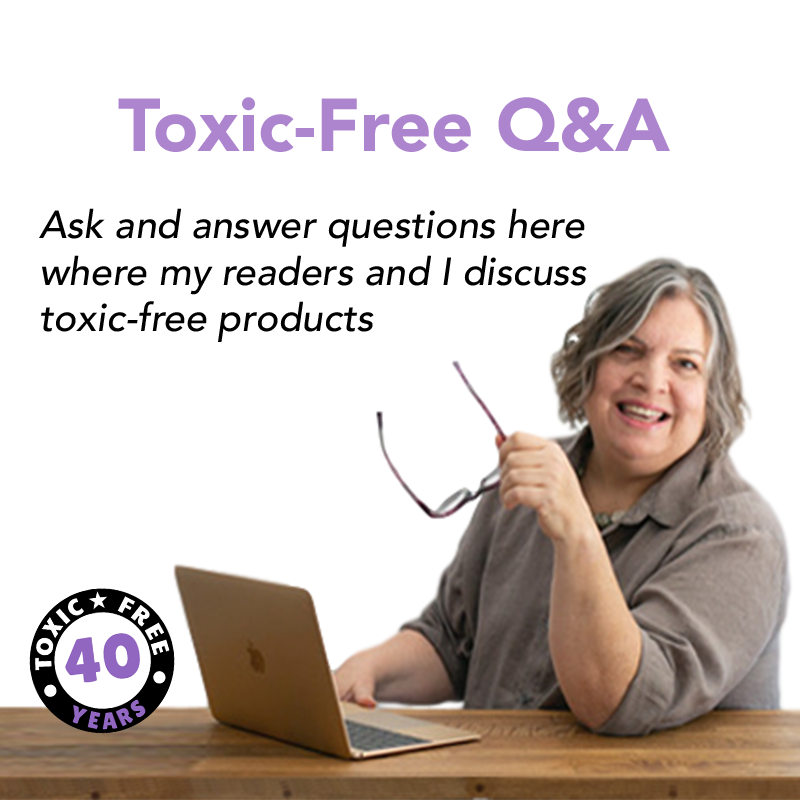
Submitted questions will be posted with my response by the following Tuesday or before.
Submitted comments will be moderated and approved within 24 hours.
Non Toxic Finish For Wooden Spoons
Question from k
What is a non-toxic alternative to the recommended mineral oil for wooden spoons and salad bowls?
Debra’s Answer
This has already been covered on these posts:
Nontoxic tile cleaner
Question from b.b.
i have a tile floor in the bathroom and living room, and I dont want to use vinegar to clean it with.
what alternatives do you recommend i use instead and why?
Debra’s Answer
We just use hot water to clean our tile floor in the bathroom, or a little baking soda if we need to scrub, and a little soap if there is something greasy, which is not often.
Readers, what do you use?
Frosting Without Cane Sugar?
Question from Miss D
Do you have a recipe for frosting made without cane sugar?
Debra’s Answer
Unfortunately, most frosting is based on confectioner’s sugar, which makes the consistency.
There is something called Boiled Icing which is usually made with sugar syrup. You may be able to make this with honey, probably not agave, probably maple syrup. I haven’t tried it, but here is the recipe.
Boiled Icing
Beat egg white until frothy, add cream of tartar. Beat until stiff and dry. Cook sugar and water until it has reaches the honey stage, or drops heavily from spoon. Add 5 tablespoons slowly to egg, beating in well. Then cook remainder of syrup until it threads and pour over egg, beating thoroughly. Add flavoring and beat until cool. If any of you try this, let me know how it turns out.
Bread Machine without nonstick
Question from alex
Does anyone know if such a thing exists? Thanks!
Debra’s Answer
Readers?
Corn Or Rice
Question from CG
Hi Deborah,
I’ve heard about (and even seen a couple of times) food products packaged with corn- or rice-based plastic.
Do you know of any zipper bags made from corn or rice? I use tons of plastic bags, and I would like to find a better alternative.
Debra’s Answer
I haven’t seen any. Readers?
If you use a lot of plastic bags, I suggest you re-use them as many times as possible.
Corrosion on salt shaker lids
Question from Judy V.
Hi – I have some special salt shakers that are at least 60 years old. The chrome lids have some corrosion, which I understand is from the salt. Are these shakers safe to use?
Debra’s Answer
I don’t know. Chrome is plated over another metal, and I’m not sure what that other metal is.
Readers?
Aluminum v. Plastic v. Glass
Question from Lawren Coope
Hi Debra:
I am wondering what you can tell us about this subject: When making decisions at the grocery store, are we better off buying plastic, aluminum or glass (i.e. buying a soft drink)? Which of these choices has less environmental impact overall? I have read that recycling aluminum takes more energy than recycling plastic, but I also realize that plastic can only be recycled so many times.
Thanks in advance for your help on this!
Lawren
Debra’s Answer
Ah…this brings up one of my favorite subjects: life cycle analysis!
When evaluating the true impact of a product we need to look at everything from the raw materials, through manufacturing, use, and disposal, including energy use and how far it travels.
It isn’t possible yet to get this kind of data for most products, which is why I don’t talk about it much.
But we can make some educated assumptions.
Aluminum is made from a non-renewable metal that is mined, which damages ecosystems and produces mining waste. Since you asked about soft drink cans, most aluminum that gets recycled (about 60%) goes back into a perpetual cycle of making soft drink and beer cans. Aluminum cans can be remelted and back on the supermarket shelves in as little as six weeks. The aluminum industry says that cans average more than 40 percent post-consumer content, though this fact is not generally noted on the label. While that’s good, 60% of a soft drink or beer can is new mined metal. Aluminum is safe to drink from, and can be recycled. It is fairly lightweight, so it requires less energy for shipping.
Glass is made from sand, an abundant resource. It is melted down and formed into bottles. It is safe to drink from. The drawbacks are it is heavier to ship, and breaks. At the end of it’s useful life, it can be recycled, melted down, and reformed into a new product. In Nature, the elements break glass into pieces and polish the edges–sea glass is fun to collect on the beach.
Safe Hair Removal
Question from Susan H.
Is electrolysis a safe method of hair removal? I like the idea of the permanence of it.
Debra’s Answer
I don’t know of any reason why it wouldn’t be safe.
There’s no toxic exposure, except perhaps a swab of alcohol. I don’t know about electromagnetic fields and electrolysis.
The only thing is that you want to make sure the needles are sterile and the person who does the procedure follows the standard rules of hygiene so there are no infections.
Flame retardants
Question from Cathy
Dear Debra,
Thank you very much for all the information you provide on your website. I have a question: I just bought a sleep sofa from Jennifer Convertibles. I have recently read alot about flame retardants and their effect on health. Is there any way to tell if something, e.g. a couch, has been treated with flame retardants? Thank you very much!
Debra’s Answer
You can pretty much assume that most mattresses and stuffed furniture sold today has been treated with flame retardants unless it specifically states that it hasn’t been.
To be sure, check with the manufacturer.
Reactions to Oxygen Bleach
Question from PT
Have you read about anyone having a physical reaction to Oxygen Bleach products used in the laundry?
Debra’s Answer
No, but perhaps some readers will write in about their experience.
I’ve never heard of a problem with oxygen bleach.







